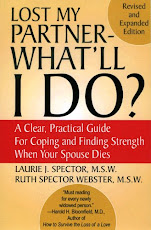
After my husband’s death, I felt like the tears would never stop.
I remember being at work, in social situations, or just driving and finding myself unexpectedly tearing up. Caught off-guard and often embarrassed, I’d head for the nearest private place (like a restroom or quiet street), to try to pull myself together.
I realize some people consider crying a form of self-pity.
But I’ve learned that tears are nature’s way of helping us release tension. The best way to do the mourning is to do the grieving. And that means every tear helps.
So trust yourself. Your mind does have a shut-off valve.
Look for tips about the best private places to grieve in our next post.
Ruth
